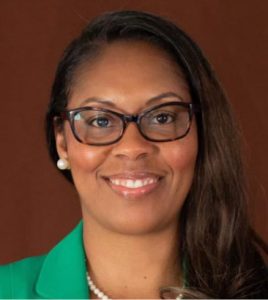
TaKeia N. Anthony is Associate Professor of History and Academic Support Liaison for the Center of Excellence for the Study of Kentucky African-Americans (CESKAA) at Kentucky State University, and Bowling Green’s first African American woman to earn a PhD in history. She has authored, most recently, The Universal Ethiopian Students’ Association, 1927–1948: Mobilizing Diaspora (Palgrave Macmillan, 2019). Anthony currently serves as the Delta Research and Educational Foundation Vivian A. Ware Fellow as well as a member of the Howard University Social Justice Consortium, a Mellon Foundation Just Futures initiative. She previously held a Duke–NCCU Digital Humanities Fellowship.
We Can Do it for Ourselves: The Delta Research and Educational Foundation, Black Women’s Intellectualism, and Black Women’s Philanthropy, 1967–2022
The avant-garde leadership of Delta Sigma Theta Sorority, Inc. is preeminent. Founded in 1913 by twenty-two women at Howard University, the Sorority’s first act of public service was participating that same year in the Woman Suffrage Procession. Since its founding, the organization of college-educated Black women has been committed to serving Black communities throughout the African Diaspora. With the establishment in 1967 of the Delta Research and Educational Foundation (DREF), a public charity supporting scholastic achievement, public service programs, and research initiatives focused on African American women, Delta Sigma Theta became the first Black sorority and first Black women’s organization to own and operate a foundation. We Can Do It for Ourselves chronicles DREF’s impact over half a century, centering both DREF and the Sorority in Black women’s intellectual and philanthropic histories.

Maria Dikcis is an American Council of Learned Societies Emerging Voices Fellow at the University of Chicago’s Pozen Family Center for Human Rights. In the fall of 2022, she will join the Department of English at Harvard University as a College Fellow in Media. Her research and teaching interests include 20th- and 21st-century American literature, poetry and poetics, critical race and ethnic studies, digital media theory, data science, and critical prison studies. Dikcis’ scholarly work is published or forthcoming in ASAP/Journal, Chicago Review, and The Cambridge Companion to American Poetry and Politics Since 1900.
Ink, Wave, Signal, Code: Multiethnic American Poetry’s Media Ecologies After 1965
This digital monograph illuminates the vibrant range of textured materialities, vocal resonances, and animated graphics that constitute contemporary multiethnic poetry in the United States. Ink, Wave, Signal, Code traces a literary history examining how Black, Asian American, and Latinx poets use diverse technologies—spanning from mimeograph printing machines and vinyl records to television sets and digital computer interfaces—to innovate new forms of racial representation and political critique throughout the post–1965 era. More precisely, it argues that through their experimentations with these media conditions, multiethnic poets challenge conventions of political and cultural authority by reimagining racial identity, like poetic form, as a material construction that adapts to evolving technological paradigms. Such poets have continuously revealed how race possesses a social existence that is rendered palpable, visible, and audible across the many layers of media, from their physical hardware and interfaces to their intangible networks and affects.
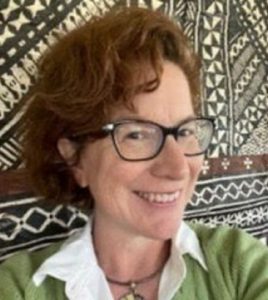
Amy E. Earhart is Associate Professor of English and affiliated faculty of Africana Studies at Texas A&M University. Earhart has received numerous grants and fellowships, including an NEH–Mellon Fellowship for Digital Publication (2020). Her publications on digital humanities topics include Traces of Old, Uses of the New: The Emergence of Digital Literary Studies (University of Michigan Press, 2015), the co-edited volume The American Literature Scholar in the Digital Age (University of Michigan Press, 2010), and a number of articles and book chapters in the Debates in Digital Humanities series, Digital Humanities Quarterly, DSH: The Journal of Digital Scholarship in the Humanities, Digital Studies/Le champ numérique, and Textual Cultures.
Digital Humanities and the Infrastructures of Race in African American Literature
Digital humanities has struggled to fully realize the interpretive possibilities of race in digital literary texts because of the difficulty of representing such complexity with the metadata, software, and algorithms central to DH research. By employing multiple lenses of data, digital tools, and analysis, this project examines how technological infrastructure and algorithms interact with African American-authored literary texts to construct and deconstruct racial identities, and it reveals how seemingly naturalized technological infrastructures impact meaning. The project uses the Scalar platform coupled with reposited data, visualizations, and project documents.
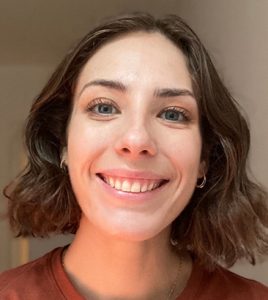
Emily Lynell Edwards is Assistant Professor of Digital Humanities and Educational Technologist at St. Francis College in Brooklyn, NY. She currently serves as co-director of the grant Digital Humanities Across the Curriculum (DHAC), funded by the NEH. She is also a General Editor at Digital Humanities Quarterly. Her research focuses on the intersection of digital media, technologies and platforms, and race, gender, and immigration in global contexts. Her articles have appeared in New Media & Society, Critical Studies in Media Communication, and Glocalism: Journal of culture, politics and innovation.
Islamophobia Gone Global: Far-Right Politics on Social Media
The rise of far-right, racist political communities on social media platforms is a global phenomenon and on-going crisis. Combining data visualization, social network analysis, and close feminist reading in a transnational, comparative study, this digital monograph project examines German and American far-right, digitally networked users to reveal how such communities are fostering a transnational and ethnically exclusionary, anti-Muslim vision of society. Edwards’ research reconstructs a fragmented far-right media ecosystem that also converses about COVID-19 conspiracies, gender reactionary ideology, and anti-Semitic historical tropes. By tracking and tracing the contours and conversations of these communities on Twitter, Islamophobia Gone Global will provide policymakers, researchers, and scholars with a potential roadmap to intervene in this activity.
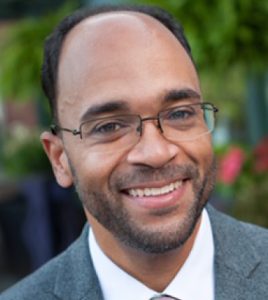
Tyrone McKinley Freeman is Associate Professor of Philanthropic Studies at the Indiana University Lilly Family School of Philanthropy, Adjunct Associate Professor of Africana Studies at IUPUI, and Research Associate at the Smithsonian National Museum of American History. Freeman is a 2022 winner of the Dan David Research Prize, “the largest history prize in the world.” His research focuses on philanthropy in communities of color and in higher education. His books include Madam C.J. Walker’s Gospel of Giving: Black Women’s Philanthropy during Jim Crow (University of Illinois Press, 2020), winner of two national awards, and the co-authored Race, Gender and Leadership in Nonprofit Organizations (Palgrave Macmillan, 2011). His work has appeared or been cited in the New York Times, O: The Oprah Magazine, Black Perspectives, TIME, Harvard Business Review, and many others.
The Giving Syllabus: Philanthropy across the African American Experience
This multimodal monograph project reinterprets the historical meaning and role of philanthropy—broadly defined as voluntary action for the public good—in America by centering African Americans from all walks of life rather than the typical wealthy White elites who dominate philanthropy historiography and media attention. The project presents: a historical periodization of African American philanthropy from Pre-colonial West Africa to the turn of the 21st century; primary and secondary sources from within each period to examine the character and context of African American philanthropy as it evolved over time; interpretive and analytical narratives anchoring each period, and the transitions in between them, to give a comprehensive analysis of the evolution of philanthropy by, for, and among African Americans. The Giving Syllabus, which re-presents American philanthropy from a Black perspective, will help to establish Black Philanthropy as an academic subject of inquiry and contribute to the building of a nonprofit sector that is inclusive of and responsive to diverse communities in an increasingly interconnected and demographically diverse world.

Karen Kossie-Chernyshev is Professor of History at Texas Southern University. She is the first African American woman to earn a PhD in history from a Texas institution and the first African American to earn a PhD in history from Rice University. Kossie-Chernyshev has served in a wide variety of leadership roles, including as director of the Summer Workshop on African American Texas History (SWATH). She has received numerous grants, including a fellowship from the NEH for her project “Mapping the Missionary Impulse of African American Pentecostals in the Southwest.” Her rediscovery of the papers of Texas’ earliest known African American female novelist resulted in two prize-winning books: Angie Brown: A Jim Crow Romance (Outskirts Press, 2017) and Recovering Five Generations Hence: The Life and Writing of Lillian Jones Horace (Texas A&M University Press, 2013).
The Diary of Lillian Jones Horace
Lillian Jones Horace (1880–1965) was Texas’ earliest known African American female novelist, the first Black woman nationally to author a utopia before 1950, and one of only two Black women to own a publishing company before 1920. Her first novel, Five Generations Hence (1916), predates Zora Neale Hurston’s Their Eyes Were Watching God by twenty-one years. A critical re-examination of representations of race, class, and gender during the Jim Crow era, this digital book project couples an annotated edition of Horace’s diary with sound and video recordings and photographs from the Horace archive. The publication will make Horace’s overlooked writings more accessible to students and scholars of history, and help preserve the memory of a remarkable Texas woman whose voice is still relevant for our time.

Christopher J. Lee is Associate Professor of History and Africana Studies at Lafayette College in Easton, PA. He has received numerous grants from national and international programs and institutions, including the NEH and the Mellon Foundation, and he has held residential fellowships at the John W. Kluge Center at the Library of Congress and the W.E.B. Du Bois Institute at Harvard University, as a Sheila Biddle Ford Foundation Fellow, among others. Lee has published seven books on different aspects of modern African history, global history, and African literature, most recently Culture and Liberation: Exile Writings, 1966–1985 (Seagull Books, 2022) and, in the Routledge Critical Thinkers Series, Kwame Anthony Appiah (Routledge, 2021). A number of his journal articles have received awards, including recognition in The Best American Essays 2015 for “Mourning Mandela.”
Exile and the Aural Imagination: The Radio Recordings of African Writers
Radio broadcast recordings originally made at the Transcription Centre in London during the 1960s, now held as digital files at the Archives of Traditional Music at Indiana University, Bloomington, form the core of this digital book project. The recordings involve a number of well-known African writers who were in exile at the time, including Wole Soyinka, Chinua Achebe, Lewis Nkosi, Dennis Brutus, and Alex La Guma. The ultimate purpose of Exile and the Aural Imagination is to utilize, analyze, and make more widely available these recordings for scholars and students in order to underscore that the emergence of postcolonial African literature occurred with the assistance of other media, such as radio.

Divya Nair received her PhD in English from the University of Pennsylvania in 2021 and presently works for a nonprofit focused on family literacy and making English-language learning available to immigrant communities in Philadelphia, where she also runs a community book club on W.E.B. Du Bois at the Free Library of Philadelphia. Her research interests include classical reception, early modern English literature, eighteenth-century studies, and digital humanities. As an adjunct instructor in the Department of Languages and Literature at Lincoln University of Pennsylvania, she taught courses on Shakespeare and Africa, and the philosophy and methodology of nonviolence. She has two book chapters forthcoming on Africa and Asia in the historiography of Du Bois.
Classical Reception and the Problem of the Color Line in Early Modern English Literature: A Digital Mappa Mundi and Palimpsest
This multimodal monograph compares Greco-Roman relations with Africans and Asians to the reception and transformation of relationships between Europe, Africa, and Asia in early modern English literature and culture, as slavery and colonialism become the dominant mode of production between the Renaissance and the Romantic age. The book draws on Du Bois’ philosophy of history and phenomenology of consciousness to argue that some English writers between the sixteenth and nineteenth centuries did not always see their literature as separate from the literary traditions of ancient Greek and Rome, Africa, Asia, or even the Americas. The book’s multi-layered argument will take advantage of a variety of digital humanities tools and methodologies.
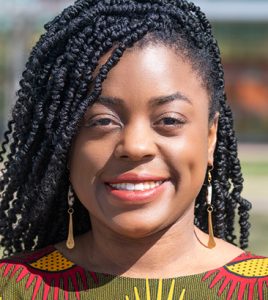
Ashley Robertson Preston is Assistant Professor of History at Howard University. She was previously director of the Mary McLeod Bethune Foundation at Bethune–Cookman University in Daytona Beach, FL, and an archives technician for the National Archives for Black Women’s History in Washington, DC. She is the author of Mary McLeod Bethune in Florida: Bringing Social Justice to the Sunshine State (The History Press, 2015). Her second book, which is under contract with the University of Florida Press, examines the international activism of Bethune, framing her as a Pan-Africanist. Preston has published articles in the Journal of Negro Education, Journal of Black Studies, and Journal of African American History.
The Fierce Activism of Mrs. Mary McLeod Bethune
Mary McLeod Bethune (1875–1955) was a world-renowned educator, presidential advisor, and women’s rights advocate. This project, which aims to highlight Bethune’s international, national, and local activism, amplifies the power of her voice via the inclusion of audio and video recordings of her speeches as well as a selection of writings from her tenure as a columnist for the Chicago Defender and Pittsburgh Courier, two of the leading African American newspapers in the early 20th century.
The multimedia, interactive book will offer readers a deeper understanding of one of the most influential Black women of her time. The longform narrative will include chapters on her 1904 founding of the Educational and Industrial Training School for Negro Girls, her early years as a clubwoman, her work with presidents, her international travels, her 1935 founding of the National Council of Negro Women, and her World War II involvement.
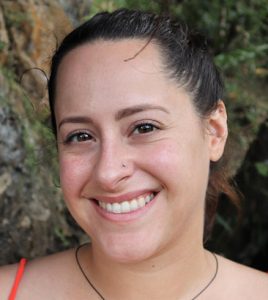
Olivia A. Quintanilla is a President’s Postdoctoral Fellow in the Department of Environmental Studies at the University of California Santa Barbara. Her family is from Guahan and she has used her academic opportunities as a Chamoru scholar to research the unique histories and futures of Pacific island life. She is interested in climate justice, marine justice, Pacific underwater ecology, and Indigenous environmental activism. Published or forthcoming book chapters are concerned with refugee narratives, digital inequity within Latinx communities, and digital futures for graduate education in the humanities. In 2021, Quintanilla participated in the NEH-Supported Digital Humanities Research Institute hosted by GC Digital Initiatives at the CUNY Graduate Center.
Marine Justice: Indigenous Island Ecologies and the Right to Nature
This digital monograph examines risks to the biodiversity of militarized island ecologies home to Indigenous communities by analyzing the growing digital archive of data on endangered animals living near culturally significant sites, underwater ecosystems, and marine life. The book argues that there is great potential to use island biodiversity data to tell stories of animals, ocean, and Indigenous life that can reconnect people with nature, inspire sustainable urban development practices, and support environmental justice. Marine Justice moves the field of Ethnic Studies into collaborative dialogue with environmental justice studies, urban studies, Pacific Island studies, Indigenous studies, digital humanities, and critical military studies.

Michael Ralph is Professor and Chair of the Department of Afro-American Studies and Director of the Mellon Mays Undergraduate Fellowship Program at Howard University. He is also Professor at the NYU School of Medicine. A prolific author, Ralph is currently working on two books that center on slavery, insurance, and incarceration. His research integrates political science, economics, history, and medical anthropology through an explicit focus on debt, slavery, insurance, forensics, and incarceration. Ralph has received numerous grants and awards, from the National Science Foundation, the American Council of Learned Societies, and the W.E.B. Du Bois Institute at Harvard University, where he held a Sheila Biddle Ford Foundation Fellowship, among many other honors.
Life: Insurance and Actuarial Science in Antebellum Slavery
The end of legalized slavery is seen as the birth of freedom. But, just as slavery was
drawing to a close, the US life insurance industry took off. And, while life insurance is perfectly legal, it traffics in the monetary value of a human life. Life is the first book to demonstrate how the history of life insurance is intertwined with the demise of legalized slavery. In the process, it shows how a monetary calculus used to rank enslaved persons shaped strategies for establishing the monetary value of free citizens, from the nineteenth century to the present. This foundational investigation also explains how and why just as Americans had successfully dismantled a public hierarchy in human lives, they embraced one steeped in confidential, ostensibly neutral, scientific data. Life thus makes a major contribution to the resurgent interest in making sense of the role enslavement played in shaping techniques of accounting, risk management, and actuarial science.

Max Renner is Assistant Professor in the Department of Digital Humanities and New Media at Molloy College in Rockville Centre, NY. His research interests include visual rhetoric, urban communication, and game studies, among others. He has authored or co-authored several journal articles on digital technologies and civil engagement, the rhetorical potential of architecture as public art, and graffiti scenes as spaces of engagement. Renner works as a project partner and humanities advisor on the Virtual Martin Luther King (vMLK) project, supported by the NEH Digital Projects for the Public program (2019) and an ACLS Digital Extension Grant (2021), among other organizations.
The Virtual Martin Luther King (vMLK) Project (2.0)
This multimodal book project brings longform scholarly interpretation to a transmedia recreation of a lost Martin Luther King speech, commonly known as the “Fill Up the Jails” speech. Delivered in February 1960 in Durham, NC, just over two weeks into the now historic Woolworth lunch counter sit-in a few hours away in Greensboro, the important but unrecorded speech marked the first time that Dr. King openly encouraged activists to disrupt and break the law through nonviolent confrontation. The publication aims to equip readers with historical and cultural knowledge of civic and political engagement and transformation, and provide pedagogical materials in the areas of civil rights history, social studies, public address, and visual/digital rhetoric.
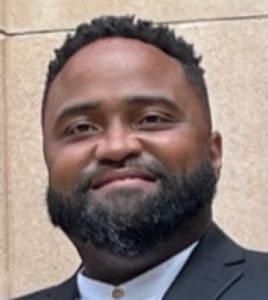
Marco Robinson is Associate Professor of History and Assistant Director of the Ruth J. Simmons Center for Race and Justice at Prairie View A&M University. He serves as Co-Principal Investigator on the Mellon Foundation-supported initiative, Enhancing the Humanities at PVAMU through an African-American Studies Program, and on the National Historical Publications and Records Commission-supported Texas Domestic Slave Project. He is the co-editor of Contemporary Debates in Social Justice: An Interdisciplinary Approach to Exploring the Lives of Black and Brown Americans (Kendall Hunt, 2021), and he has authored essays on the pivotal role played by women during the integration of public schools in North Mississippi as well as the efficacy of oral histories and collaborative work to document the histories of Black communities in the American South. Robinson also studies Afro-Latino and Caribbean history, and agricultural history.
“On the Upward Trend”: The Impact of Prairie View A&M University’s College of Agriculture and Agricultural Extension Services on Communities of Color during the Jim Crow Era in Texas
The history of Prairie View A&M University, Texas’ oldest state-supported historically Black university, entails the rich and vibrant experiences of Black and Brown Texans from the Antebellum period to the present day. This digital monograph presents the history of PVAMU’s College of Agriculture—since its founding in 1879 a leader in the true land-grant tradition of academics, extension, and research—with a focus on women’s work within the program and outreach to the Latinx community in Texas during the Jim Crow era. It incorporates records from PVAMU’s Special Collections and Archives Department, particularly agricultural extension workers’ reports from the early to the mid 1900s, including memos, photos, program flyers, diagrams of farming techniques, and maps of service areas. These materials are currently being digitized thanks to a Preservation Assistance Grant from the NEH. The inclusion of interactive elements will further enhance the reading experience.

La Tanya L. Rogers is Associate Professor of Literature and Drama, and Director of the W.E.B. Du Bois Honors Program at Fisk University. A past recipient of a Mellon Mays Undergraduate Fellowship, she also serves as President of the College English Association, Mid-Atlantic Group. Rogers has published articles and lectured widely on a range of topics, from economic racism in Brazil to Harlem Renaissance writers to contemporary artist Kara Walker.
Mimicry, Minstrelsy, and Masking: Theorizing Black Surrogacy in the Plays of Suzan-Lori Parks
American playwright, novelist, screenwriter, and educator Suzan-Lori Parks (b. 1963) won the Pulitzer Prize for Drama in 2002 for her play Topdog/Underdog, making her the first African American woman in US history to win the prize in drama. Mimicry, Minstrelsy, and Masking examines this and three other plays by Parks—The America Play, In the Blood, and F—ing A—through the lens of what the author calls Black Surrogacy, a dramatic technique that involves replacing white literary and historical figures with Black characters. The digital book, enhanced with video clips of productions of Parks’ plays, argues that while the playwright uses Black Surrogacy to challenge convention and offer social and political commentaries, the technique ultimately reinforces the very stereotypes and misconceptions about Black people that it seeks to counter.
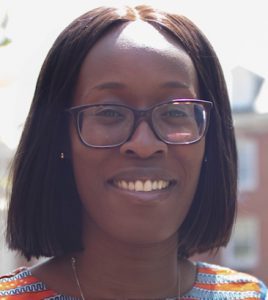
Amy Yeboah Quarkume is Associate Professor of Africana Studies in the Department of Afro-American Studies at Howard University. She is also a National Center for Atmospheric Research Early Career Faculty Innovator, a Mellon Foundation New Directions Fellow and a White House Initiative HBCU All-Star Campus Mentor. As a filmmaker, she has produced two documentaries on closing the excellence gap for Black students. Her work as a data scientist centers around AI bias, data pollution, and environmental justice. Her scholarly articles have appeared in The Black Scholar and Women, Gender, and Families of Color, among others, and she has made numerous popular media appearances. Yeboah serves on the editorial board for Black Lives in the Diaspora: Past / Present / Future, a book series published by Columbia University Press in partnership with Howard.
Data Pollution and Savage Algorithms
Artificial Intelligence (AI) has enhanced and privileged industries worldwide, at astonishing speeds utilizing data. In recent years, AI infiltration into earth science has spiked dramatically, helping researchers to achieve improved weather forecasts and to enhance energy efficiency, for example. Yet without ethical standards and equitable representation, data becomes dangerous. Algorithms provide incredibly fast answers, but they can also simultaneously disenfranchise marginalized populations. Employing an Africana Studies framework to examine intersections of race, gender, and technology, this digital book project probes the negative impacts of societal, cultural, and historical bias in earth science on Black, Brown, and Tribal communities across seven US states.